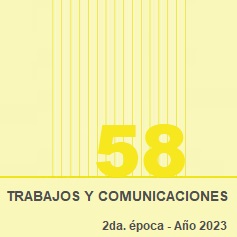Senses and law: An introduction to a budding field of research
Main Article Content
Abstract
This dossier brings together works that address the complex plot between senses, law and justice. With pre-eminence in the treatment of particular cases, it illuminates, from the prism offered by the judicial files, the intersections in which the meanings of the sensible are configured, negotiated and reconfigured. The body and its senses played an important role in different juridical-legal contexts. As a result, significant contributions are presented here to a budding field dedicated to sensory-legal studies that invites us to rethink the relationship between bodies-senses-law over time.
Downloads
Article Details

This work is licensed under a Creative Commons Attribution-NonCommercial-ShareAlike 4.0 International License.
This work is licensed under a Creative Commons Attribution 4.0 International (https://creativecommons.org/licenses/by-nc-sa/4.0/deed.es).
References
Agüero, A. (2008). Castigar y perdonar cuando conviene a la República. La justicia penal de Córdoba del Tucumán, siglos XVII y XVIII. Centro de estudios políticos y constitucionales.
Antaki, M. (2019). Le tournant sensoriel en droit: vers un droit sensible et sensé? Canadian Journal of Law and Society / Revue Canadienne Droit et Société, 34(2), 361-370. DOI: https://doi.org/10.1017/cls.2019.16
Barreneche, O. (2001). Dentro de la ley, todo: La justicia criminal de Buenos Aires en la etapa formativa del sistema penal moderno de la Argentina. Al Margen.
Barriera, D. (2019). Historia y justicia. Cultura, política y sociedad en el Río de la Plata (Siglos XVI-XIX). Prometeo.
Bently, L. y Flynn, L. (Eds.). (1996). Law and the Senses: Sensational Jurisprudence. Pluto Press.
Casagrande, A. E. (2019). Gobierno De Justicia Poder De Policia. La construcción oeconomica del orden social en Buenos Aires, 1776-1829. Tirant Lo Blanch.
Clavero, B. (1981). Historia y antropología. De la división convencional de las ciencias sociales. LLULL. Revista de la Sociedad Española de Historia de las Ciencias y de las Técnicas, 4(6-7), 21-33.
Clavero, B. (1991). Antidora. Antropología católica de la economía moderna. Giuffré.
Coronado Schwindt, G., Palazzo, E. y Rodríguez, G. (2019). Sentidos y emociones con historia. Pasado Abierto. Revista del CEHis, 9, 2-13.
Costa, P. (2016). A ‘Spatial Turn’ for Legal History? A Tentative Assessment. En M. Meccarelli y J. Solla Sastre (Eds.), Spatial and Temporal Dimensions for Legal History. Research Experiences and Itineraries (pp. 27-62). Max Planck Institute for European Legal History.
Duve, T. (2016). Global Legal History. A methodological approach. Max Planck Institute fo European Legal History. Research Paper Series, 4, 1-22. DOI: https://doi.org/10.2139/ssrn.2781104
Duve, T. y Pihlajamäki, H. (2015). Introduction: New Horizons of Derecho Indiano. En T. Duve y H. Pihlajamäki (Eds.), New horizons in Spanish colonial law. Contributions to transnational early modern legal history (pp. 1-8). Max Planck Institute for European Legal History. DOI: https://doi.org/10.12946/gplh3
Farge, A. (2008). Efusión y tormento. El relato de los cuerpos. Historia del pueblo en el siglo XVIII. Katz. DOI: https://doi.org/10.2307/j.ctvm7bd4j
García-Gallo, A. (1967). Problemas metodológicos de la historia del derecho indiano. Revista del Instituto de Historia del Derecho Ricardo Levene, 13, 13-64.
Garriga, C. (2020). ¿De qué hablamos los historiadores del derecho cuando hablamos de derecho?. Revista Direito Mackenzie, 14(1), 1-24. DOI: https://doi.org/10.5935/2317-2622/direitomackenzie.v14n113329
Hamilton, S., Majury, D., Moore, D., Sargent, N. y Wilke, C. (2017). Sensing Law. Routledge.
Hespanha, A. M. (1986). A historiografia jurídico-institucional e a morte do Estado. Anuario de Filosofía del Derecho, 3, 191-227.
Hibbitts, B. J. (1992). Coming to our senses: communication and legal expression in of. performance cultures. Emory Law Journal, 41, 873–960.
Hibbits, B. J. (1994). Making sense of metaphors: visuality, aurality, and the reconfiguration of American legal discourse. Cardozo Law Review, 16, 229–356.
Hibbitts, B. J. (1995). Making motions: the embodiment of law in gesture. Journal Contemporary Legal Issues, 6, 51–81.
Howes, D. (2005). Architecture of the Senses. En M. Zardini (Ed.), Sense of the City: An Alternative Approach to Urbanism (pp. 322-331). Lars Muller Publishers.
Howes, D. y Classen, C. (2013). Ways of Sensing: Understanding the Senses in Society. Routledge. DOI: https://doi.org/10.4324/9781315856032
Howes, D. (2014). El creciente campo de los estudios sensoriales. RELACES. Revista Latinoamericana de Estudios sobre cuerpos, emociones y sociedad, 6(15), 10-26.
Howes, D. (2017). Law’s sensorium. On the media of law and the evidence of the senses in historical and cross-cultural perspective. En S. Hamilton, D. Majury, D. Moore, N. Sargent y C. Wilke (Coords.), Sensing Law (pp. 53-72). Routledge.
Howes, D. (2019a). Prólogo. En O. Sabido Ramos (Coord.), Los sentidos del cuerpo: el giro sensorial en la investigación social y los estudios de género (pp. 9-15). Centro de Investigaciones y Estudios de Género, Universidad Nacional Autónoma de México.
Howes, D. (2019b). Prologue: Introduction to Sensori-Legal Studies. Canadian Journal of Law and Society, La Revue Canadienne Droit et Société, 34(2), 173-189. DOI: https://doi.org/10.1017/cls.2019.28
Howes, D. (2023). Sensorial Investigations. A History of the Senses in Anthropology, Psychology, and Law. The Pennsylvania State University Press. DOI: https://doi.org/10.5325/jj.5736154
Hyde, A. (1997). Bodies of Law. Princeton University Press. DOI: https://doi.org/10.1515/9781400822317
Jay, M. (2011). The Senses in History. In the Realm of the Senses: An Introduction. The American Historical Review, 116(2), 307–315. DOI: https://doi.org/10.1086/ahr.116.2.307
Mayo, C., Mallo, S. y Barreneche, O. (1989). Plebe urbana y justicia colonial: las fuentes judiciales. Notas para su manejo metodológico. Frontera, sociedad y justicia coloniales, 1, 47-80.
Tau Anzoátegui, V. (1997). Nuevos Horizontes en el estudio histórico del Derecho Indiano. Instituto de Investigaciones de Historia del Derecho.
Tomás y Valiente, F. (2004). Manual de Historia del Derecho Español. Tecnos.
